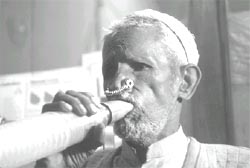Right medicine?
Right medicine?

two new herbal drugs, Respicare and Asmon, have been launched in the market to treat bronchial asthma. However, difference of opinion prevails among the allopathic and Ayurvedic practitioners about the efficacy of the drugs. Bronchial asthma is caused by allergens and leads to difficulty in breathing. Around five million Indians suffer from asthma.
Though inhalers are effective in controlling the symptoms of asthma, they have side effects like brittleness of bones, hypertension, changes in the skin structure, diabetes and cataract. They can also cause yeast infection in the mouth and hoarseness of voice. On the other hand, herbal drugs do not have adverse side effects.
Bacfo Pharmaceuticals (India) Limited, a New Delhi-based company, claims its medicine, Respicare, will provide relief to asthma patients.
| Common name | Botanical name |
RESPICARE Mulethi Tulsi Maricha Pipali Shunthi Puskharmool Talispatra Vanshlochana Vrihadela Gulbanafsa Karkat Shringi ASMON Kamini Latakasturi Ajwain Lavang Vasa Dudhi Curry patta |
|
Similar claims have been made by the Indian Institute of Chemical Biology ( iicb ), Kolkata, which has developed the medicine Asmon, being manufactured by Herbochem Remedies (India) Private Limited. Asmon is effective, claim the manufacturers, in controlling bronchial asthma while Respicare’s manufacturer says its herbal product can also help to deal with related problems like bronchitis (asthma caused due to viral or bacterial infections) and infections of the nose and throat.
Respicare has been made with herbs mentioned in Ayurvedic texts and the tablet is supposed to be effective in reducing respiratory problems caused due to pollution. The concoction consists of 11 herbs, most of which are commonly used by traditional practitioners. “Though viral or bacterial infections and pollen grains cause most of he respiratory problems, they are more commonly related to allergens such as cigarette smoke and exhaust fumes,” points out S Kumar, vice president, projects, research and development at Bacfo.
To check the effectiveness of the tablet, clinical trials based on observation were carried out on 264 patients and the medicine’s effectiveness was tested for six months. The patients were studied and the results were classified as those showing complete improvement, partial improvement and no improvement at all.
The tests showed that the use of steroids, inhalers and nebulisers was reduced by those using Respicare. “Though the preparation does not cure respira







